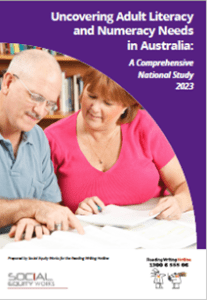01 Nov New Research into Adult Literacy and Numeracy Needs

The second and final phase of our research Uncovering Adult Literacy and Numeracy Needs in Australia: A Comprehensive National Study 2023 into adult literacy and numeracy needs in Australia, is now available on the Reading Writing Hotline website. With the recent endorsement of the National Skills Agreement, its research findings and recommendations are particularly timely.
A key finding from the research is that 89% of respondents reported unmet needs in their communities for adult literacy. This reaffirms the importance of offering a diverse and more comprehensive range of literacy provision as well as more innovative approaches to access people with literacy and numeracy gaps..
The research was designed to hear from community stakeholders about barriers and unmet needs. The report is based on 483 responses through surveys and focus groups. Respondents include literacy and numeracy providers, First Nations providers and community organisations, libraries and community groups. This second research phase builds on last year’s findings from surveys of literacy providers, Insights from the Classroom. The rich data captures a range of voices with deep practical experience of the literacy needs of their learners and their communities and clients.
There was huge commonality amongst all research respondents in both the first and second phases of the research on the barriers for learners and organisations and what were the areas of highest unmet need. These were backed up by Hotline caller stories.
Barriers
Lack of qualified literacy and numeracy teachers, inadequate funding, lack of flexible models of delivery that can meet learners’ individual LND needs, and lack of culturally appropriate courses and teachers were the main barriers for organisations in delivering courses and support programs.
The main barriers identified for learners were shame and embarrassment, learners not knowing where to ask for help, lack of local courses in rural and remote areas, particularly in First Nations communities and lack of transport, distance and cost in rural and remote locations.
Unmet need
The research revealed significant unmet need for LND courses and support programs. Areas of highest unmet need for all respondents from provider, community sector and library sectors were:
- individual and tailored literacy assistance
- wrap-around support to address barriers
- help with filling in forms and responding to other important documents
- pathways to accredited courses
- non-accredited courses delivered in community settings.
First Nations providers and community sector respondents also identified the following as significant gaps:
- culturally appropriate courses for First Nations people
- reading and writing for work
- culturally appropriate learning resources
- lack of beginner courses.
The research looks at the impact of unmet need and ways to address that need. Recommendations have been made around rebuilding the LND workforce, increasing funding and flexibility and enhancing delivery and access.
These recommendations resonate with the foundation skills initiatives and directions under the National Skills Agreement. In particular, “critical actions to strengthen the foundation skills sector, which may include support for the foundation skills workforce, investment in foundation skills training resources, cooperative work on foundation skills assessment tools, and a national suite of activities to better reach groups with diverse and complex needs” (from fact sheet on Foundation Skills accessed 26 October 2023 on DEWR website).




